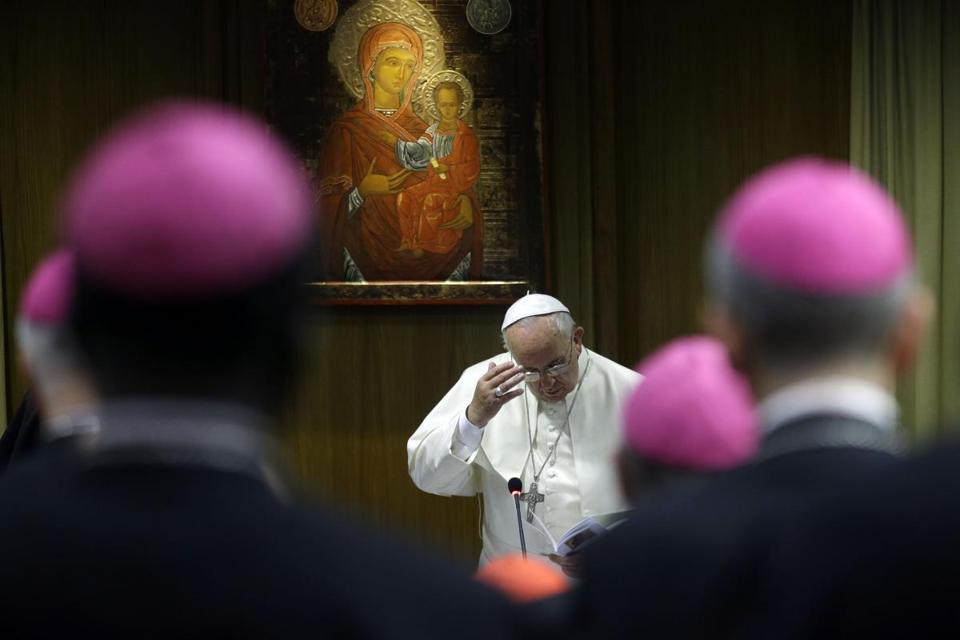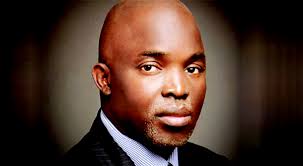GREGORIO BORGIA/ASSOCIATED PRESS
Pope Francis attended a morning session of Monday’s synod at the Vatican.
ROME — For the first time in a semi-official Vatican document, a summit of Catholic bishops from around the world convened by Pope Francis acknowledged Monday that relationships that don’t accord with Catholic teaching, including same-sex unions, can have positive moral value.
While the midterm report from a synod of bishops doesn’t signal any shift in Catholic teaching, it does suggest a mammoth change in tone in terms of how Catholicism relates to whole categories of people often estranged from the church, including gays and lesbians, couples living together outside marriage, and people who have divorced and remarried.
Cardinal Péter Erdo of Hungary, who is serving as the general reporter for the meeting, delivered a report Monday on the results of the first round of discussion. While Erdo concluded that there is no push to change the content of church teaching, he said there is a clear desire to change the way the church engages people who don’t live that teaching, including gays and lesbians.
Erdo said the church ought to provide homosexuals “a welcoming home.”
“Without denying the moral problems connected to homosexual unions,” he said, “it has to be noted that there are cases in which mutual aid to the point of sacrifice constitutes a precious support in the life of the partners.”
“Homosexuals have gifts and qualities to offer the Christian community,” the cardinal said. “Are we capable of welcoming these people?”
Erdo reported the bishops want a stance of “accepting and valuing” the sexual orientation of all persons, albeit “without compromising Catholic doctrine on the family and matrimony.”
‘We want a church that is . . . listening to and dialoguing with the contemporary world.’
Quote Icon
That language marks the first time in a church document that a positive dimension to same-sex unions has been openly acknowledged.
A midterm report in a synod of bishops has no official standing in Catholic theology as a statement of binding church teaching, and it’s also possible that the meeting’s approach could evolve before the synod closes at the end of the week.
Moreover, this synod will reach no final conclusions, as Francis has designed it to lay the groundwork for another, larger summit of bishops in October 2015. In any event, in the Catholic system a synod of bishops has no power of its own, but merely makes recommendations to the pope.
Nonetheless, Monday’s report is indicative of where a majority of the roughly 200 bishops gathered in Rome presently stand, most of whom are the elected presidents of bishops’ conferences around the world.
In general, Erdo said the synod wants to reach out to people living outside the boundaries of what the church considers the full truth about marriage, including “those who have experienced failure or find themselves in the most diverse situations.”
A Vatican spokesman had previously said that the synod wanted to find a new, more positive language to present Catholic teaching on sex, avoiding phrases such as “living in sin” and a “contraceptive mentality” in favor of rhetoric that is more affirming and less judgmental.
Cardinal Luis Antonio Tagle of Manila in the Philippines said that the synod so far has “breathed the same air” of the Second Vatican Council, a historic summit of all the Catholic bishops of the world in the mid-1960s that launched Catholicism on a path of modernization and reform.
During a Vatican news conference Monday, Archbishop Bruno Forte of Italy, a participant in the synod and a figure whose theological views Francis is known to value, said recognizing the positive aspects of same-sex relationships is a matter of “intellectual honesty and spiritual charity.”
“We want a church that is not self-absorbed, but a church listening to and dialoguing with the contemporary world,” Forte said.
Francis called this gathering of bishops to ponder all manner of issues related to the family, including whether Catholics who divorce and remarry outside the church ought to be able to receive communion at Sunday Mass and the other sacraments of the church.
On that issue, Erdo said there’s no consensus yet among the bishops.
“Some argued in favor of the present regulations because of their theological foundation,” he said, referring to Catholic teaching that marriage is indissoluble, meaning for life.
“Others were in favor of a greater opening on very precise conditions,” he said, suggesting that if the rules were to be relaxed, preference would be given to “those who have endured separation and divorce unjustly.”
Since his election in March 2013, the pope has said repeatedly that he doesn’t intend to change Catholic doctrine on hot-button issues such as homosexuality, abortion, and contraception. At the same time, he has also made outreach to people who don’t share those teachings one of the hallmarks of his reign.
During an airborne press conference last July, he summed up his attitude toward gay persons with the phrase, “Who am I to judge?”
Tagle emphasized that the synod has not reached any conclusions, and even when it does it is simply setting the stage for another gathering of bishops next year.
“The drama continues,” he said.












